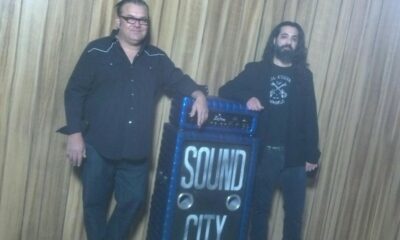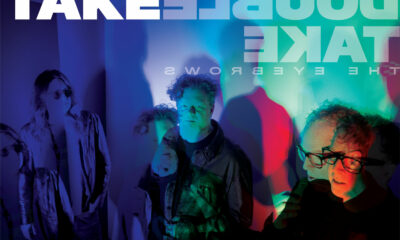Interviews
Interview with Queensrÿche lead vocalist Geoff Tate
Singer Geoff Tate chatted with PureGrainAudio about the reissue package by phone as he propped himself up for yet another round of interviews with his first cup of coffee for the day.

When Queensryche released Operation: Mindcrime in 1988, the incredible concept album finally put the band on the mainstream radar. It also propped up the act’s standing at then-label EMI, which in turn put its promotional power behind the band’s follow-up album, Empire. The wider-spread media interest, a deep-pocketed marketing campaign and a sharp, musically cohesive album coincided to produce six radio hits, the most from any Queensryche record. Equally crucial to the success of songs like the title track, “Silent Lucidity” and “Best I Can” were MTV rotation of the videos shot by Matt Mahurin. The videos themselves also lent a hand: The director’s shadowy, timeless images perfectly underscored their musical messages and set the clips apart from the beer-and-bimbo footage clogging the channel.
EMI is celebrating the 20th anniversary of Empire by reissuing it September 14 with bonus tracks “Last Time in Paris,” “Dirty Little Secret” and “Scarborough Fair,” along with a disc of a November 1990 concert at the Hammersmith Odeon in London. The label also remastered the tracks – surprising, since its record’s sonic clarity has remained clear enough to hear the proverbial pin drop. Singer Geoff Tate chatted with PureGrainAudio about the reissue package by phone as he propped himself up for yet another round of interviews with his first cup of coffee for the day.
The Empire album has been remastered for the reissue. What made you guys decide that you wanted to go back and do that?
Geoff Tate: We didn’t. We didn’t decide anything. [chuckles] Record company does. They own it. They own it, so they wanna celebrate the 20th anniversary and they’re rarin’ to go, so they spearheaded the whole thing and threw it altogether and said, “What do you think of this?” “Oh, that’s beautiful. Wonderful. OK. Great.”
I don’t look at the past. I don’t really care about the past, you know? I’m always lookin’ at what’s next and workin’ on current things, personally. But other people really appreciate that kind of stuff.
So they decided they wanted to do this and they came along and said, “You wanna come along for the ride?”
Tate: Yeah, that’s pretty much the way everything works with records, reissues, all that stuff. Record companies handle all that stuff. We find out when they send it to us, usually when they set press up for us to talk about it. [laughs again] Yesterday, I spent all day talking about it and I haven’t even seen a copy of the thing yet… I don’t even know what it looks like, what it’s got in it. I mean, [I was just given] a description.
Wow.
Tate: That’s the way it is for everybody.
Did they choose the live concert material?
Tate: They gave us a list of stuff and options, and we said, “Well, OK, the London show was pretty good.”
When you recorded that album, did you end up with any material that went into the vaults, or did you write pretty tight with it?
Tate: I think we used everything that we had.
Is that pretty standard when you guys go in and make a record?
Tate: Pretty standard, yeah. We have a few things left over here and there but most of the time we use everything we have. And these days, gosh, the record companies, they want like 15, 16 songs, you know? It’s a huge amount of writing to do.
When you remember that time when you were putting that album together, what do you remember the most about it?
Tate: Writing the songs, you know. Experiencing what the songs were about. Just coming off of the Mindcrime album and tour and being able to sit in one place for a year in the middle of Seattle, which was cool, and write and live life like a regular person was kind of cool. Just get up every day in the same bed and walk down to the store to get breakfast. That kind of thing was nice. That’s what I remember.
About how long did it take to put the record together?
Tate: I don’t know. Maybe, probably the whole thing, from writing to recording was about a year, I guess.
With Mindcrime being a concept record and then Empire very much went back to the singles format, was it easier to write songs individually after everything you guys had put into Mindcrime?
Tate: Well, it was just a different approach. Songwriting is never easy, but it was just a different approach of doing it, and less to think about in the grand scale of things, having to link things together, it’s a lot of thought and planning, and Empire was just a collection of individual songs.
I think the thing that musically about that album that’s really different for us is we had this kind of experiment going where we’d write a song, and then we’d listen to and decide, “Well, what doesn’t need to be there?” And we just started editing it and taking instruments out and parts out until we had a real basic structure of what the song needed to be able to be understood or experienced. And that was kind of our criteria for making that album with writing the songs was writing really, really simple songs that had only two important elements: melody, and melody. [laughs] Lots and lots of melody was our goal.
“Silent Lucidity” is one of the biggest hits off that record. The band has said through the years that the fans tell you how much that song means to them; they’ve played it at weddings and funerals and all these different occasions. What are some stories that fans have told you about that song where you’re like, “Wow,” where you were really surprised to hear that they played it at a funeral or a graduation?
Tate: Well, that’s kind of pretty much it. It’s just an abundance of stories. “They played it at my high school prom dance,” or, “I heard this when I was delivering my baby,” or, “When my father died, they played this song at his funeral”; that kind of thing. One of those songs that grabs people. Especially on an album like that, Empire, that had such financial success. That was a hugely promoted record. EMI spent millions promoting that record and a lot of people were exposed to it. Millions of people were exposed to it as compared to other records we’ve done where just our fan base really has experience with it or exposed to it.
Besides the fact that it was promoted – because, of course, people can hear a song and say, “Well, I don’t really dig it” – what do you think it is about that song that’s really resonated with people?
Tate: Well, I think it’s a good song. It’s got a really beautiful feel to it. If you just kind of dissect it all and actually read all the lyrics, it doesn’t make a lot of sense, you know? But it has lines in it, lyric lines in it that are really touching on their own, and it’s kind of one of those songs [where] you make up your own purpose for it, I think, in your own head. You take certain lines out of it, out of context, and you kind of make up your own song in your head, you know? And that seems to be something that people do with it. And it has a beautiful melody that really catches people’s ear.
You toured a very long time behind that record, and after you finished that, you went on to the Promised Land album. On Promised Land, some of the songs did talk about kind of being disillusioned with what you’re taught was supposed to be the meaning of success. What are some of the things that happened on the Empire album cycle that left you guys feeling like, “OK, we’ve succeeded, but this isn’t exactly what I thought it was gonna be like”?
Tate: TV shows. Award ceremonies. Action-figure dolls. That kind of stuff. People camping out in front of your house at all hours of the day and night. Kind of weird, you know. When you look at those shows on TV, you think, “Oh, wow, this is really glamorous and cool.” But when you’re actually at ’em, at the show itself, it’s so false and pretentious, and the people there are not nice. They’re not really interested in socializing. They’re just there to sell themselves. And everybody’s consumed with doing that. Every move they make is designed and planned out to sell themselves. “How do I look right now? I have to stand at this angle right here. And I have to talk overt op of somebody else because attention is drawn to myself.” It’s bizarre. I don’t know. It’s very uncomfortable, the whole situation.
I don’t have any other questions related to Empire, but do you have anything in particular you’d like to say about the album?
Tate: You know, I was doing some interviews yesterday with a couple magazines that specialize in audio, and they were saying that the Empire album is one of those albums that people really appreciate from an audio standpoint. And it made me think of all the times that I’ve seen this happen and been told this, but a lot of studio engineers, like when they go into a new studio and are getting ready to do a band’s record, they’ll reference the speakers and the system with Empire, the album. Certain tracks on it to make sure that the speakers in the studio are operating correctly at the right frequencies. Sound engineers live use it to tune the PA. They’ll play that song off that album over the big PA system to make sure the PA is set up correctly.
It’s a really, really finely recorded record. Jimbo Barton engineered it, and it’s just one of his audio masterpieces for a rock band. He just did a great job on it. We had very simple, open songs in order to let the audio work really well, and so it was just a nice combination of him and us, and it worked really well. And that’s kind of an interesting thing for me. I don’t know if that’s interesting to your readers.
It’s a really good point. I don’t have that kind of audio knowledge, but I know that the only way I can really describe how the album sounds is it sounds very clean. Even though when you listen to it and I can recognize the time period, it doesn’t sound like an album, like, “Oh, that’s a dated-sounding 1991 record.” It’s just a good-sounding album.
Tate: Yeah, that’s a very good point, it doesn’t sound dated at all. It sounds current and like it could fit in any time. It’s kind of timeless. It’s funny, isn’t it, how some records, you can place what decade they’re from or what year even, you know – how it was recorded or what kind of instruments they’re using. The style of drums that you hear on the record that really dictates the time period. Crazy.
-

 Music4 days ago
Music4 days agoTake That (w/ Olly Murs) Kick Off Four-Night Leeds Stint with Hit-Laden Spectacular [Photos]
-

 Alternative/Rock5 days ago
Alternative/Rock5 days agoThe V13 Fix #010 w/ High on Fire, NOFX, My Dying Bride and more
-

 Hardcore/Punk2 weeks ago
Hardcore/Punk2 weeks agoHastings Beat Punks Kid Kapichi Vent Their Frustrations at Leeds Beckett University [Photos]
-

 Culture2 weeks ago
Culture2 weeks agoCirque Du Soleil OVO Takes Leeds Fans on a Unique, Unforgettable Journey [Photos]
-

 Alternative/Rock2 weeks ago
Alternative/Rock2 weeks agoA Rejuvenated Dream State are ‘Still Dreaming’ as They Bounce Into Manchester YES [Photos]
-

 Features4 days ago
Features4 days agoTour Diary: Gen & The Degenerates Party Their Way Across America
-

 Culture6 days ago
Culture6 days agoDan Carter & George Miller Chat Foodinati Live, Heavy Metal Charities and Pre-Gig Meals
-

 Music6 days ago
Music6 days agoReclusive Producer Stumbleine Premieres Beat-Driven New Single “Cinderhaze”














